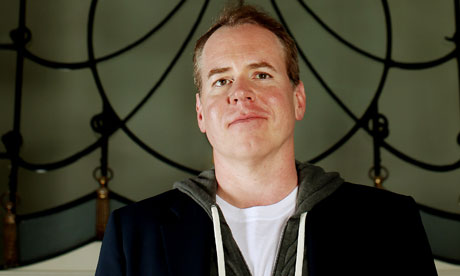by Derek Askey, Colorado Review associate fiction editor
“Alice Munro was always an overrated writer,” claimed author Bret Easton Ellis via Twitter last week, “and now that she’s won the Nobel, she always will be.”
This photo manages to capture only 1/16th of Ellis’ smugness.
One has to hand it to Ellis, in the sad way one hands consolations to children who consistently fail to rise above their peers, for so openly inviting accusations of sour grapes. Ellis, the author of American Psycho and Less Than Zero, has garnered respectable sales, but the type of critical acclaim Munro is known for has eluded him. He has his fans (stuff like Details magazine), and many of his books have been adapted into movies, and there is certainly an audience out there for his hyper-violent, nihilistic, thoroughly disposable fictions.
But having an audience, of course, isn’t the same as being worthwhile.
It’s telling that Ellis’s most engaging writing of late has been his Twitter account, which boasts over four hundred thousand followers. He seems custom-built for the form: snarky, throwaway idiocy that attracts attention for about five minutes and is just as quickly forgotten. Munro’s work—towering, thoroughgoing, whole-lives-on-the-page type stuff—is nearly its ideological opposite.
And little wonder, too, that Ellis would find Munro to be overrated. What worth in Munro’s sublime work might Ellis be able to find, the guy who claimed once, in an interview, that the negative feminist response to American Psycho was “retarded” because “women are crazy”?
With the exception of Ellis’s predictable, inflammatory remarks, the objection to her winning the Nobel has essentially been nil. She’s worked diligently for decades, honing her craft; I resist the temptation to say that she’s gotten better with her years, given the quality of work that she’s exhibited since her earliest work.
In 2004, Corrections author Jonathan Franzen claimed, “Reading Munro puts me in that state of quiet reflection in which I think about my own life: about the decisions I’ve made, the things I’ve done and haven’t done, the kind of person I am, the prospect of death.” To what higher calling might an author aspire, but to elicit empathy and reflection from her readers, especially readers so astute and critical as Jonathan Franzen?
All of Munro’s fans probably have similar experiences, similar stories, similar reasons for being so solidly on the Munro bandwagon. My own, briefly: her Selected Stories had been assigned when I was an undergraduate, taking an intermediate course in fiction writing. She’s a difficult writer to teach (“Alice Munro is the bane of every creative writing teacher’s existence,” author Joseph Boyden said, given that her stories break so many rules of the short form). And yet the seriousness with which she approached her stories was hugely influential to me then, a call to arms. “The complexity of things—the things within things—just seems to be endless,” she famously claimed once in an interview, and demonstrates in nearly every one of her stories. “I mean nothing is easy, nothing is simple.”
Munro, whose work towers over so many others, but Ellis’s most of all.
If you’ve a better mantra for fiction writing, I’d be happy to hear it. To encounter work that embodied that complexity at such an early stage in my writing was extraordinarily important, and continues to be important to me today.
If nothing else, it severely lowered my tolerance for authors whose aims were much less: authors like Bret Easton Ellis, who content themselves to hide behind snark and exaggeration instead of aiming to capture things as they really are. Munro has made my patience for writing like Ellis’s awfully slim, and I’m thankful to her for that, too.
Not to mention the not-unimportant feature of Munro that so many have highlighted: she isn’t a jerk. This oughtn’t matter so much—I should to be able to take a book on its own terms, and not fuss over the fact that Roth/Bukowski/Hemingway/you-name-it is such a terrible person—but with Munro, it does seem to matter. Or, as Colorado Review fiction editor Steven Schwartz said of her humility: “It’s in every part of her work, from the rhythms of her sentences to the deference shown to her rural settings, without sacrificing one bit the overall force of her writing. Hard to imagine anyone better at observing the world with such power and yet standing before it with so much humility at the same time.”
Which brings us back, of course, to Bret Easton Ellis: the spoiled white kid from California who seems pathologically devoid of humility, nearly immune to it. And whose work shows it.
Though the subject is well below her, I’d love to read a Munro story in which she tackled someone like Ellis, and lent him the humanity she manages for each of her characters. He doesn’t deserve it, of course, but if anyone is capable of handling the task, it’s Munro. Because it surely isn’t Ellis. He’s too busy trolling away at Twitter, lauding Kardashians, bashing authors almost unanimously regarded as better than himself, mattering less and less and less and less.

